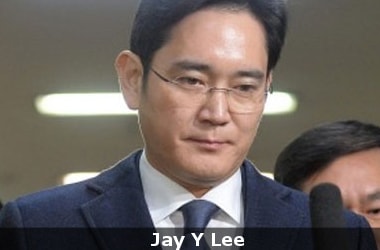
South Korean prosecutors charged Samsung Group chief Jay Y. Lee with bribery and embezzlement on 28th March 2017 as the top businesses announced the dismantling of its corporate strategy office.
This is the latest development in the graft scandal that rocked the nation.
48-year-old Lee was arrested on Feb 17, over the alleged role in the corruption scandal involving impeached president Park Geun-hye.
This is a fresh blow for the conglomerate in Asia's 4th largest economy.
Lee, the third generation leader of the tech major chaebol and 4 other executives were charged with bribery and embezzlement.
Charges against Lee include pledging bribery to companies and organizations tied to Park's confidant, Choi Soon-sil to cement control of his business empire.
The charges came ahead of a Constitutional Court ruling on whether to uphold parliament's December impeachment of Park.
That impeachment was triggered by accusations that she colluded with Choi to pressure big businesses, including Samsung, to donate to two foundations set up to back the president's policy initiatives.
The 65-year-old daughter of a former military strongman has had her powers suspended. The Constitutional Court's ruling is expected sometime in March.
In case of impeachment, Park would become the country's first democratically elected president to be thrown out of office.
While a sitting president cannot be indicted, the special prosecutors nevertheless have classified her as a suspect.
They did not disclose specifics of the charges against Lee or other Samsung executives.
Samsung Group, which has denied paying bribes to Park or seeking improper favours from her, declined to comment on the indictment.
Park, Choi and Lee have all denied wrongdoing. Based on the main charges levied against Lee, he could face up to 20 years in prison if convicted.
Samsung's corporate strategy office, a key nerve centre responsible for major initiatives such as investment in new businesses, amid accusations by politicians that it was a key organ for illicit lobbying efforts was also shut down.
Composed of around 200 employees hand-picked from various affiliates, the office did not exist as a legal entity but wielded enormous power as the instrument of control for the founding Lee family.
Samsung said the chief executives and boards of the various affiliates such as Samsung Electronics and Samsung C&T Corp would set their own course going forward.
This is a massive change to South Korea's chaebol management style.
A Samsung Group spokeswoman said it had not yet decided how the conglomerate would deal with group-level issues such as coordination among affiliates.
Lee was already moving towards more board-centric management to improve governance.
The executive became a board member of Samsung Electronics last year.
The prosecutors also charged four more at Samsung with offences including bribery and hiding assets overseas - group Vice Chairman Choi Gee-sung, President Chang Choong-ki, Samsung Electronics President Park Sang-jin and Executive Vice President Hwang Sung-soo.
Samsung Group said in its announcement that Choi, Chang and Park had resigned.
Samsung chief Lee is accused of pledging 43 billion won ($38 million) in bribes to a company and organisations backed by President Park's confidant, Choi.
Samsung: Know More- Headquarters: Seoul, South Korea
- Founder: Lee Byung-chul
- Founded: 1 March 1938, Daegu, South Korea
- Owner: Lee Kun-hee
- Revenue: 305 billion USD (2014)
- Number of employees: 489,000